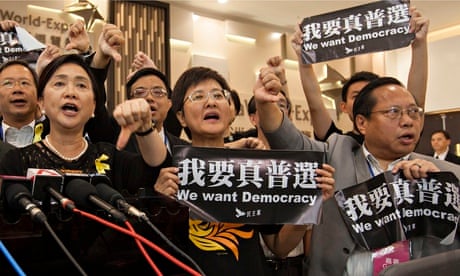Support for a civil disobedience campaign demanding democratic reforms in Hong Kong has weakened because of Beijing's tough stance against open elections, a leader of the Occupy Central with Love and Peace movement has said.
Benny Tai's remarks came as it emerged that China had demanded British MPs halt an inquiry examining how the bilateral agreement on reforms in the former British colony has been implemented.
Qin Gang, spokesman for the Chinese foreign ministry, said: "Hong Kong has returned to the motherland … Matters relating to Hong Kong's political reform are [our] internal affairs. We do not allow any outside forces to interfere."
He told a regular news briefing that the letter from the foreign affairs committee of China's National People's Congress was "totally justifiable and perfectly reasonable".
Sir Richard Ottaway, chairman of the foreign affairs select committee, told Reuters: "My job is to see if Britain is living up to its side of the undertakings and, secondly, if China isn't living up to their undertakings, then what is the British government doing about it … This is not interfering in the internal affairs of China."
Earlier, he told the BBC that "there seems to be a prima facie case that the undertakings given have been breached".
Beijing's framework for long-promised universal suffrage for the election of a chief executive in 2017 is highly restrictive. Analysts say it rules out the prospect of a pan-democrat candidate standing, because only two or three people can be nominated and they must have the support of at least half of a committee packed with Beijing loyalists.
Pan-democrat politicians have said they will reject the plans when they are presented to Hong Kong's Legislative Council. Unless some change course, the plans will fall and the chief executive will again be chosen by a small committee of mainly pro-Beijing members of the elite.
Tai acknowledged that the movement was unlikely to change the "political reality" of China's ruling.
He told Bloomberg that "the number of people joining us will not be as big as we expect[ed], because of the very pragmatic thinking of Hong Kong people" and toned down previous predictions by saying the movement could "maybe" muster 10,000 or more protesters.
He also appeared to imply that the occupation of the financial district might take place on a public holiday – due in Hong Kong on 9 September to mark the mid-autumn festival and 1 and 2 October, combining national day and the Chung Yeung festival – indicating that organisers had chosen a date which would cause minimal damage to the economy.
Occupy Central with Love and Peace later issued a statement to "clarify" his comments, stating: "It is not correct to say that we have less support from the community after Beijing has made the decision. Although some pragmatic supporters may leave, new supporters are joining us because they are angry about the Chinese government's decision and are firm to show the dignity and willpower of Hong Kongers.
"We Hong Kongers won't accept failure in our road to democracy."
It noted that the Occupy movement was designed to promote public engagement though various means, adding: "We will keep working hard on it, particularly when democratic reform seems unlikely in the coming few years."
Surya Deva, a professor at City University of Hong Kong's school of law, told AFP that Tai's comments were "definitely a backing down, but it is a strategic backing down".
He added: "They know they can't really get the desired change by a short, intensive burst of civil disobedience. They're getting ready perhaps for a long-term campaign – and they need to build a base."
An editorial in the Chinese edition of the state-run Global Times said the campaign had "brought toxic radicalism and populism to Hong Kong" but had received far less support than it had hoped internationally.
It added: "In the Cold Palace [where the emperor's out-of-favour concubines were sent] and the dustbin of history, there are many antagonists who used to be under the global spotlight. If the radical opposition of Hong Kong keeps on following the wrong direction, those are the places it belongs to."
Police said on Tuesday that they had arrested 22 pro-democracy protesters who targeted Li Fei, a senior Chinese official visiting the city to explain the plans.
In a separate development, a Hong Kong newspaper scrapped a weekly column by a hedge fund manager and Occupy Central member.
Edward Chin said the Chinese-language Hong Kong Economic Journal told him that his column, which he has written since 2006, had been axed because of a new page design.
Chin said he believed it was a political decision. The Hong Kong Economic Journal, one of the most-read Chinese language dailies, did not immediately respond to a request for comment, Reuters said.








Comments (…)
Sign in or create your Guardian account to join the discussion